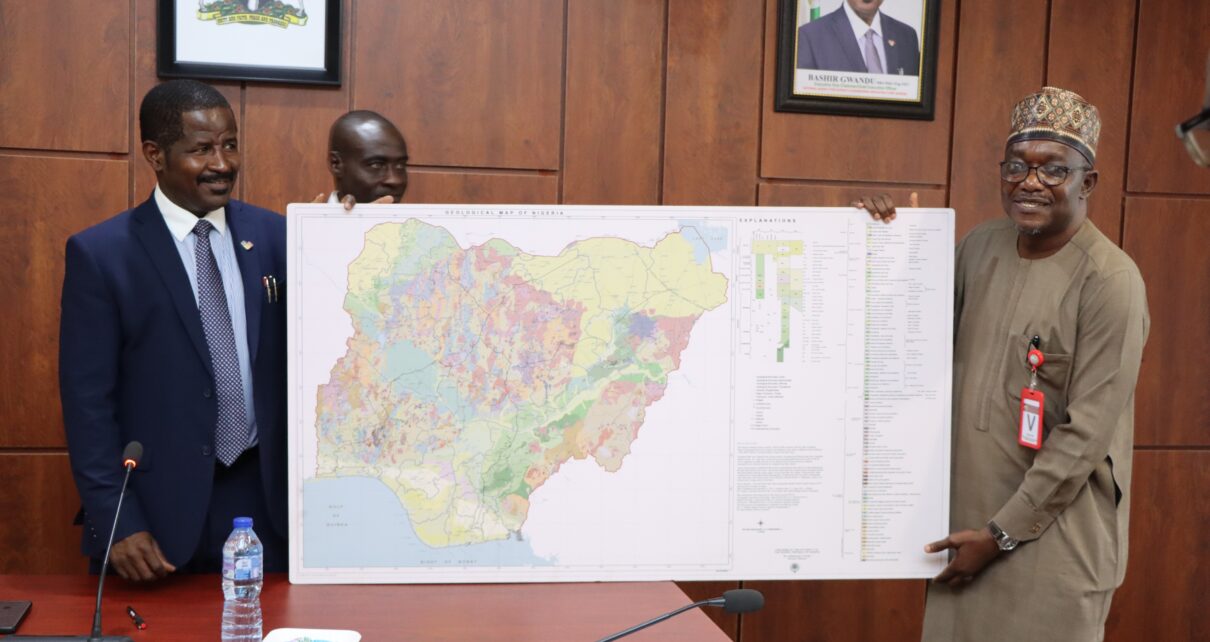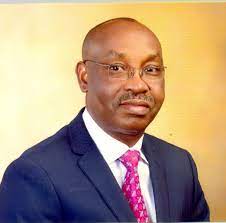….partners Geological Survey Agency
The National Agency for Science and Engineering Infrastructure (NASENI) on Tuesday unveiled plans for a national policy that will stop the exportation of Nigeria’s valuable solid minerals to foreign countries as a strategic step towards domesticating the production of the end-products locally.
The agency, in a statement issued by its Director, Information and Protocol, Olusegun Aiyeoyenikan, indicated that to achieve this objective, it wass partnering the Nigerian Geological Survey Agency (NGSA) to identify, analyze and profile different strategic minerals with a view to domesticating the local production of end-products that can result from such minerals.
The Executive Vice Chairman/Chief Executive Officer of NASENI, Dr. Bashir Gwandu, was quoted as making this disclosure when he received the Director-General of Nigerian Geological Survey Agency (NGSA), Dr. Abdulrazaq Garba who was on a working visit to NASENI headquarters on Monday in Abuja.
Following discussions between the two CEOs, the two agencies agreed to work on areas of possible collaborations on how to domesticate the end-product that can result from the abundant mineral resources in the country in order to create jobs, improve the economy and reduce capital flights by encouraging potential investors to set up processing plants in Nigeria for local production.
Speaking at the meeting, the Executive Vice Chairman/Chief Executive Officer of NASENI, Dr. Bashir Gwandu, noted Nigeria had so many strategic raw materials and must focus on processing of her solid minerals through a policy that would stop the exportation of certain raw materials and encourage investors, especially international manufacturers to come and establish their plants in Nigeria and produce locally.
Citing examples of lithium, titanium, low grade cobalt, nickel, tungsten ore, copper, phosphate, and kaolin which are in large quantities across the country, Gwandu said undocumented or artisanal miners are exporting thousands of tonnes of lithium weekly without knowing the value of other associated minerals such as rubidium and cesium in the lithium.
Gwandu explained that since electric vehicle (EV) battery can be made from it and that he has invited some foreign companies from around the world that produce batteries including Chinese investors to discuss ways of ensuring that lithium batteries are manufactured locally in Nigeria.
He clarified: “We have a lot of phosphate in many states such as Sokoto and Kebbi and lithium is in abundance in Nigeria especially Kebbi, Nasarawa and Kwara states. Lithium phosphate is cheaper than other combinations and we also have lithium ion and lithium manganese. We want to start from assembly plants in the first instance while we await the actual production facility of the raw materials for the production of lithium batteries. We can develop assembling capacity even before we can have the main factory.
“We have the raw materials and we are going to produce something that would have direct impact on our economy. We cannot continue to be exporting raw materials and import finished goods only. We can use our resources in areas of technology to process the materials. It will be good if we put a policy that will limit export of raw materials so that companies will come and partner with us and produce locally”, Gwandu added.
The NASENI boss pointed out that the agency wanted to partner with other agencies and work together to figure out the compositions of the raw materials in the country and make sure that the end products are locally produced that will add value to the economy, adding that NASENI is ready to work together with NGSA on strategic Solid Minerals and other products that can have direct positive impact on Nigeria’s GDP whilst limiting our forex spending.
In his response, the Director-General of Nigerian Geological Survey Agency (NGSA), Dr. Abdulrazaq Garba, said that he was excited that NASENI established an Institute in Nasarawa state for solid minerals research, promising that he would work with NASENI on creation of more laboratories for scientific researches and mineral analysis.
He stressed the need for Nigerian Agencies to synergized and work together in ensuring that the raw materials scattered all over the country are harnessed and processed as it will not only add value to the nation’s economy but create job opportunities as well as wealth creation.
Garba said: “If we can have a synergy, we can take it beyond this, and we can begin to domesticate the use of raw materials. We have the composition and details of the location of so many of them. What we need is to work together to domesticate industrial minerals processing. So, we are here to seek collaboration on technological development and domestication of the use of our industrial minerals”, he stated.
The two agencies subsequently agreed to work together on the issue of national policy to ban exportation of strategic minerals at the highest levels of government.
Photo Caption
L-R: Dr. Bashir Gwandu, Executive Vice Chairman, National Agency for Science and Engineering Infrastructure (NASENI), receiving from Dr. Abdulrazak Garba, Director-General, Nigerian Geological Survey Agency (NGSA), a geological map containing locations of solid minerals in Nigeria during a working visit to the NASENI headquarters on Monday July 31 in Abuja




